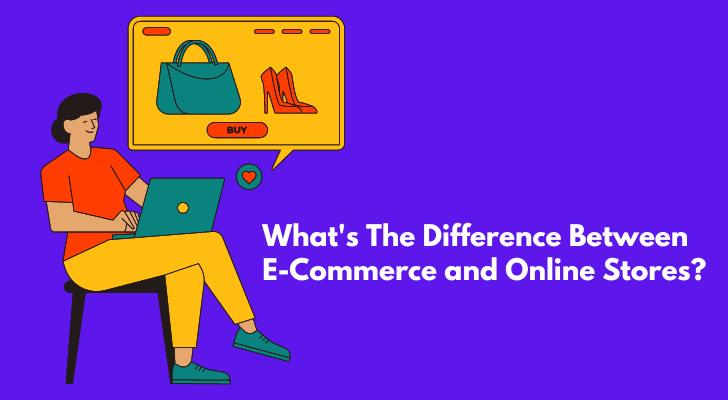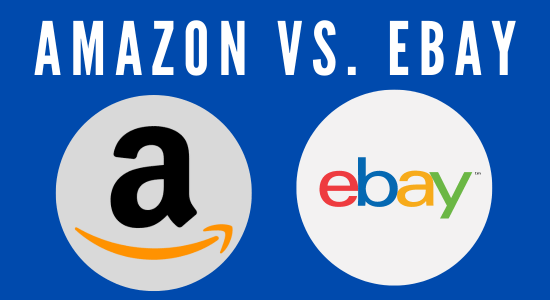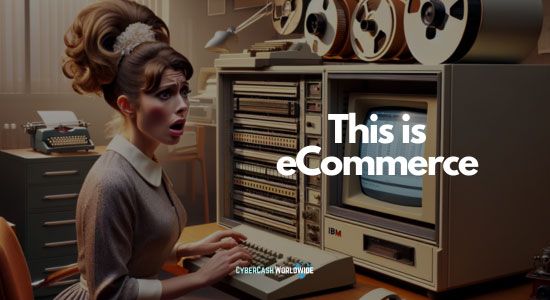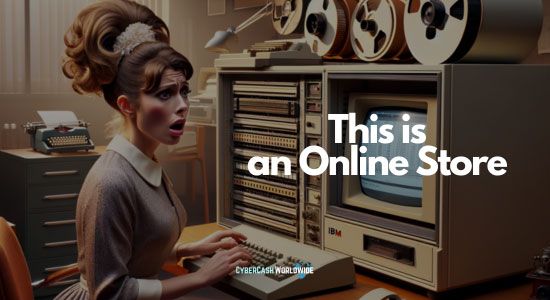We see so many "how to e-commerce" guides, but almost 100% of them talk about how to run an online store, either on a marketplace such as Amazon and eBay or using your own web platform. So e-commerce = online store. Isn't that right? Why do they always use the term "e-commerce" or "eCommerce"? Why can't they say "online store"? Is there a difference between the two?

What's The Difference Between E-Commerce and Online Stores?
The term "e-commerce" is much broader than online stores. You will understand if I tell you e-commerce that is not exactly an online store. The following platforms are all e-commerce because they involve business transactions online, but you'll see they are not online "stores".
1. Online marketplaces, classifieds and listing platforms:
While online marketplaces like Amazon and eBay were mentioned earlier as examples of online stores, there are other types of marketplaces that do not function primarily as individual stores. These platforms connect buyers and sellers, but the transactions occur between the buyers and sellers directly, rather than through a central e-commerce store. Examples include;
- Etsy, Craigslist, and Gumtree allow us to list and sell items and connect with potential buyers.
- Some allow us to list services, such as Airbnb for accommodations.
- There are many freelancing service marketplaces such as Upwork, Fiverr, and Freelancer.com.
2. Online payment processors:
Companies that provide online payment processing services, such as PayPal, Stripe, and Square, enable businesses and individuals to accept electronic payments securely over the Internet. While they facilitate e-commerce transactions, they do not function as online stores themselves.
3. Digital advertising platforms:
Platforms that enable businesses to advertise and promote their products or services online, such as Google Ads, Facebook Ads, and LinkedIn Ads, are part of the e-commerce ecosystem. They provide the means for businesses to reach their target audiences and generate sales or leads, but they are not online stores in themselves.
4. Online auction platforms:
Websites dedicated to online auctions, like eBay Auctions or Sotheby's Online Auctions, enable sellers to list items for bidding, and buyers can participate in the bidding process. While transactions occur through these platforms, they are not traditional online stores.
5. Crowdfunding platforms:
Platforms like Kickstarter and Indiegogo provide a space for individuals and businesses to raise funds for their projects or products. These platforms facilitate financial transactions but do not function as online stores in the conventional sense.
6. Digital subscriptions and memberships:
Platforms that offer subscription-based access to digital content or services fall within the realm of e-commerce. This includes services like Netflix, Hulu, and Spotify, which provide access to streaming media content for a recurring fee.
As you can see why there may be so many "how to run an e-commerce business" guides out there, but almost 100% of them are referring to online stores.
Because an online store is the only platform that ordinary folk can create and run. We cannot create other platforms such as a marketplace or an online payment processor ourselves.
What's The Best Platform To Sell Goods Online?
The best platform to sell goods online depends on the product type, target market, and personal preferences. Here are the popular platforms to consider:

1. Online Store Platforms:
- Shopify: A widely used and user-friendly platform with a range of customizable templates and features.
- WooCommerce: A plugin for WordPress that allows you to transform your website into an online store.
- BigCommerce: A comprehensive platform known for its scalability and built-in marketing tools.
- Magento: A powerful and flexible platform suitable for larger businesses with complex needs.
2. Online Marketplaces:
- Amazon: The largest online marketplace with a massive customer base and fulfillment options like Amazon FBA.
- eBay: A popular auction-style and fixed-price marketplace known for its wide reach.
- Etsy: Ideal for handmade, vintage, and craft goods, with a niche customer base.
- Walmart Marketplace: A growing platform that provides access to Walmart's customer base.
3. Social Media Platforms:
- Facebook: Utilize Facebook Shops to set up an integrated shopping experience on your business page.
- Instagram: Leverage Instagram Shopping to tag products and allow customers to make purchases within the app.
- Pinterest: Use product pins to showcase your goods and drive traffic to your website or online store.
4. Niche Marketplaces:
- Houzz: Ideal for home decor, furniture, and renovation products.
- Newegg: Specializes in electronics and tech-related goods.
- Bandcamp: Suitable for independent musicians and artists selling digital or physical music.
5. Custom-built Websites:
If you have specific requirements or unique selling propositions, building a custom e-commerce website may be the best option. This approach allows for complete control over your branding, user experience, and functionality. However, it typically requires more technical expertise and resources.
When selecting the best platform for your business, consider factors such as ease of use, features and customization options, scalability, payment gateways and fees, customer reach, integration capabilities, and customer support. It can be helpful to assess your business goals and consult with experts or other sellers in your industry to make an informed decision.
Did You Know?
20 Things That Don't Sell Very Well Online
- Extremely Bulky or Heavy Items: These can be logistically challenging and expensive to ship, like large machinery.
- Perishable Goods: Unless there's a robust cold chain, items like fresh dairy or meat may not fare well.
- High-Value Art and Antiques: Buyers often prefer to see and verify these in person due to their value and the need for authenticity.
- Custom-Made Clothing: Without a fitting, it's hard to ensure a good fit, leading to higher return rates.
- Very Expensive Jewelry: High-value items can be a risk to purchase online due to concerns about authenticity and security.
- Live Animals: Shipping live animals is complex and often subject to strict regulations.
- Hazardous Materials: Items that are flammable, explosive, or toxic pose significant shipping challenges.
- Prescription Medicines: Due to legal restrictions and the need for a prescription, these don't generally sell well online.
- Illegal or Regulated Products: Items like weapons, certain drugs, or other regulated goods face obvious legal barriers.
- Cars and Other Vehicles: While there is a market for this, many buyers prefer to test drive and inspect vehicles in person.
- Real Estate: Typically, people prefer to see properties in person, though online listings are crucial for initial browsing.
- Handmade or One-of-a-Kind Artisan Products: These can be challenging to sell if the market doesn't understand their value.
- Complex Technology or Industrial Equipment: Often requires expert installation or inspection.
- Personalized Services: Things like haircutting or personal training are difficult to deliver online.
- Certain Books: Especially rare or out-of-print books, which collectors often want to inspect physically.
- Fragile Items: Glassware or delicate decor can be risky to ship due to potential damage.
- Plants: Susceptible to damage during shipping and require careful handling.
- Large Appliances: Shipping costs and installation needs make these challenging to sell online.
- Bed Mattresses: People often prefer to physically test them before buying.
- Certain Types of Footwear: Especially high-end or designer shoes where fit and comfort are crucial.
How competitive is an online store business?
The competitiveness of the online store business can vary depending on several factors, including the industry, niche, target market, and geographic location. Here are some key points to consider regarding the competitiveness of the online store business:
Market Saturation
Some industries and product categories may be more saturated with online stores than others. Popular and widely available products, such as consumer electronics or clothing, often have a higher level of competition compared to niche or specialized products.
Industry Competition
The level of competition within your specific industry can vary. Some industries may have established dominant players that are harder to compete with, while others may have more room for new entrants.
Branding and Differentiation
Building a strong brand and finding ways to differentiate yourself from competitors is essential in the online store business. Having a unique value proposition, offering high-quality products, providing excellent customer service, and effective marketing can help you stand out in a competitive market.
Marketing and Promotion
The effectiveness of your marketing and promotional efforts can impact your competitiveness. Effective digital marketing strategies, including search engine optimization (SEO), social media marketing, influencer collaborations, and targeted advertising, can help you reach and engage with your target audience.
Customer Experience
Providing an exceptional customer experience can be a competitive advantage. This includes factors like website design and user experience, fast and reliable shipping, responsive customer service, and hassle-free returns and exchanges.
Pricing and Value
Competing on price alone can be challenging, especially if you're selling the same products as many other online stores. Offering value-added services, bundling products, or focusing on unique product features can help justify higher prices and differentiate your business.
Market Trends and Innovation
Staying informed about market trends, consumer preferences, and emerging technologies can help you identify new opportunities and stay ahead of the competition. Embracing innovation and adapting to changing customer needs can give you a competitive edge.
While the online store business can be competitive, there are still ample opportunities for success. Through careful research, planning, effective marketing strategies, and a focus on providing value to customers, it's possible to carve out a profitable niche and thrive in the online retail landscape.
Amazon or eBay?

Deciding between Amazon and eBay as a beginner seller depends on various factors, including your specific business needs, target market, product type, and personal preferences. Here's an overview of each platform to help you make a more informed decision:
Amazon:
- Large Customer Base: Amazon has a massive customer base, making it an attractive platform to reach a wide audience and potentially generate significant sales.
- Fulfillment by Amazon (FBA): Amazon's FBA program can simplify the fulfillment process for sellers by handling inventory storage, packaging, and shipping. This can be advantageous for beginners who prefer to outsource logistics.
- Brand Recognition: Amazon is a well-known and trusted platform, which can instill confidence in buyers and provide a sense of security.
- Marketing and Advertising: Amazon offers various marketing and advertising tools to help sellers promote their products within the Amazon marketplace.
- Competition: Due to its popularity, the competition on Amazon can be intense, especially for certain product categories. It may require strong differentiation and effective marketing strategies to stand out.
eBay:
- Auction-style Listings: eBay allows sellers to utilize auction-style listings, which can be advantageous for unique or hard-to-find products that may attract bidding and potentially higher prices.
- Seller Control: eBay provides sellers with more control over the listing format, pricing, and customization options, allowing for greater flexibility in tailoring your selling strategy.
- Niche and Collectible Items: eBay is well-known for its wide range of niche and collectible items, making it a suitable platform if you specialize in such products.
- Less Competition in Some Categories: Depending on your product niche, you may encounter relatively less competition on eBay compared to Amazon, giving you a better chance of standing out.
Consider your product type, target market, desired level of control, fulfillment preferences, and the competitive landscape specific to your industry when choosing between Amazon and eBay. You can also explore both platforms simultaneously to evaluate their performance and suitability for your business.
Summing-Up: What's The Difference Between E-Commerce and Online Stores?
To sum up, the difference between e-commerce and an online store can be understood as follows:

E-commerce:
E-commerce, short for electronic commerce, refers to the broader concept of conducting business and commercial transactions online. It encompasses all forms of buying and selling goods and services electronically, including online retail, online marketplaces, digital downloads, online subscriptions, and more.
E-commerce involves the exchange of products or services using electronic means, such as the internet, digital platforms, or mobile apps.

Online Store:
An online store, also known as an e-store or web store, is a specific type of e-commerce platform that focuses on selling products or services directly to customers online. It is a digital representation of a physical retail store, allowing businesses to showcase and sell their products to customers over the internet.
An online store typically provides product catalogs, shopping cart functionality, secure payment processing, and order fulfillment options. Examples of online stores include independent branded websites, Shopify stores, WooCommerce stores, and more.
In summary, e-commerce is the broader concept that encompasses all forms of online commercial transactions, while an online store specifically refers to a digital platform focused on selling products or services online. An online store is one of the many manifestations of e-commerce.
Who Are We Kidding? They Are The Same Thing.
So here are 20 reasons why they might be considered just different terms for essentially the same thing:
- Both Sell Online: Both eCommerce and online stores are about selling products or services via the internet.
- Digital Transactions: They both involve digital transactions.
- Use of Technology: Both use similar technology platforms for operations.
- Need for Internet: They both require internet access to function.
- Global Reach: Whether it's an online store or eCommerce, they both have the potential to reach a global audience.
- Customer Interaction: They both interact with customers digitally.
- Payment Methods: Both use online payment methods like credit cards, PayPal, etc.
- Marketing Strategies: Similar digital marketing strategies can be applied to both.
- Website Interface: They typically have a website or app interface.
- Customer Service: Online customer service is a common feature in both.
- Product Display: Both display products or services online for customers to browse.
- Shopping Cart Feature: The shopping cart and checkout process are common to both.
- Customer Reviews: Both often include customer reviews and ratings.
- Mobile Accessibility: Both are accessible via mobile devices.
- Data Analysis: They use similar methods to track and analyze customer data and shopping behavior.
- Shipping Options: Both may offer various shipping options.
- Return Policies: Return and refund policies are a part of both.
- Security Measures: Security measures like SSL certificates are used in both to protect customer information.
- SEO Strategies: Search Engine Optimization (SEO) is vital for both to increase visibility.
- Social Media Integration: Integration with social media platforms is common in both.
How I "Finally" Make Over $7,000 Monthly Income
"The most valuable thing I've ever done!"
